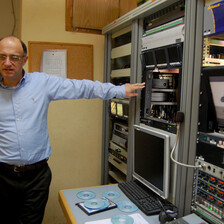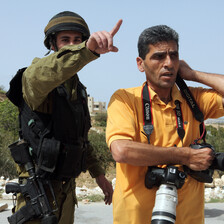The Electronic Intifada Ramallah 28 November 2012

A Palestinian journalist in Gaza City protests the jailing of three journalists.
APA images
Only hours after being interrogated on libel charges, Jihad Harb was far from intimidated. “When I see anything that’s bad, I’ll write about it,” Harb told The Electronic Intifada. “We need to be united to fight this battle.”
The Palestinian Authority’s Attorney General had called Harb in for interrogation on 31 October in Ramallah. The investigation was held to discuss an article Harb wrote which questioned the hiring and promotion processes employed by the PA.
“A number of presidential decisions related to promotions were issued for employees who did not meet the conditions for senior position,” the August article stated (“Presidential Decisions Made in the Café,” Wattan News Agency, 24 August 2012 [Arabic]).
Harb wrote that some employees were given promotions normally requiring 24 years of experience after only five years. “In 2012, a number of presidential decisions related to promotion were issued without any recommendation decision made by the Council of Ministers — a clear violation of the provisions of the Civil Service Law,” Harb reported.
A regular columnist for Ma’an News Agency and Wattan, among other Palestinian news outlets, Harb was charged with libel, slander and directly insulting employees of the office of PA President Mahmoud Abbas.
Harb has been affiliated with Fatah, the Palestinian political party that forms the majority of the current PA government in the West Bank, for 30 years. He spent seven years in Israeli jails for his political activism.
“This is a public issue and we are citizens that give money to the government. Everyone in the president’s office must be accountable to the citizens,” Harb said, adding that he believes “someone at the top” in the president’s office complained about the article.
“Someone in the Palestinian Authority doesn’t like [journalists to be] writing about public issues. They want to stay like a ‘black box’ and not let anyone know how discussions happen,” Harb said.
Political division fueling abuses
Violations of media freedoms are not only taking place in the West Bank, but have been increasingly widespread in the Gaza Strip as well.
In a 35-page report released in 2011 titled “No News is Good News: Abuses Against Journalists by Palestinian Security Forces,” Human Rights Watch found that abuses of journalists by Palestinian security forces increased by 45 percent from 2009 to 2010 (“No News is Good News,” 6 April 2011).
The arrests and harassment of journalists, Human Rights Watch found, were largely political in nature, with PA security forces arresting Hamas-affiliated journalists in the West Bank, and Hamas security forces arresting journalists that are sympathetic to Fatah in Gaza.
Since 2007, following a coup attempt in Gaza to overthrow the elected Hamas government, the occupied Palestinian territories have been divided along political lines, with the PA controlling the West Bank and Hamas governing the Gaza Strip.
“Palestinian security forces are becoming notorious for assaulting and intimidating journalists who are just trying to do their jobs,” Joe Stork, Human Rights Watch’s deputy Middle East director, said at the time. “Both the Palestinian Authority in the West Bank and Hamas in Gaza need to end these blatant attacks on free expression.”
In a recent case in Gaza, on 31 October, Hamas security forces prevented three Palestinian journalists from leaving Gaza to travel to Egypt.
According to a statement released by MADA, the Palestinian Center for Rights and Media Freedoms, Egyptian TV correspondent Majed Shiblaq and his wife, journalist Hanan Abu Dgeem, were prevented from participating in a media conference in Cairo due to supposed lack of coordination with the journalists’ union in Gaza and a lack of Hamas representation in the delegation (“Preventing three journalists in Gaza from traveling a rude violation of freedom of movement,” 1 November 2012).
“We have told them that the delegation is professional and not a political one, and nothing to do with political affairs. They told me that we must return to Gaza and request approval from the information governmental office,” Shiblaq said.
Self-censorship worrying
MADA has documented a slew of violations against journalists in both the West Bank and Gaza Strip, from arrests, intimidation and interrogations, to beatings and torture at the hands of the Palestinian security forces.
MADA Director Mousa Rimawi told The Electronic Intifada that in 2011, the number of Palestinian violations surpassed Israeli violations for the first time.
“Most of the time, in Gaza they are violating the rights of journalists who are affiliated to Fatah, and in the West Bank, they are affiliated to Hamas. When the tension between the two parties, between Fatah and Hamas, is rising, the violations increase also,” Rimawi said.
According to Rimawi, increased violations of media freedoms have led to widespread self-censorship among Palestinian journalists.
“The [political] division led to the deterioration of freedom of expression in Palestine. That led to enhanced self-censorship, which is the most dangerous kind of censorship and that affects the professional level of Palestinian media,” Rimawi said.
Journalist Jihad Harb agreed, adding that the level of investigative journalism in Palestine is very low, partly as a result of this fear of being jailed and intimidated by the security forces.
“It’s a message to all journalists and all the press: don’t write or speak or do anything on public policy and government issues. Cinema, theater, sport, that’s OK. But government policy you can’t touch,” Harb said. “It’s important for the citizens to discuss public issues in the media. It’s our right to discuss these issues and to debate.”
Meanwhile, Palestinian journalists are also being targeted — and killed — by the Israeli army. In the last decade, 16 Palestinian journalists have been killed by Israeli forces, according to a recent report by MADA. In the most recent series of attacks on the Gaza Strip, Israel repeatedly targeted a building in Gaza City which houses local and international media agencies.
Jillian Kestler-D’Amours is a reporter and documentary filmmaker based in Jerusalem. More of her work can be found at jkdamours.com.





